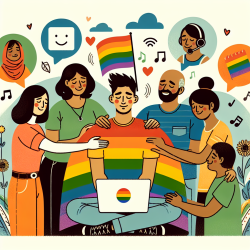Understanding the Impact of Homophobic Bullying on Sedative Use
In the realm of speech-language pathology and mental health services, understanding the nuanced factors that contribute to substance use among marginalized groups is crucial. A recent study titled The Impact of Emotional Symptoms and Family Support on the Association Between Homophobic Bullying and Sedative/Hypnotic Use among Gay and Bisexual Men in Taiwan: A Moderated Mediation Model provides valuable insights into these dynamics.
Key Findings of the Study
The study, conducted among 500 gay and bisexual men in Taiwan, reveals a significant association between homophobic bullying and the use of sedatives/hypnotics. This relationship is mediated by the severity of emotional symptoms, such as depression and anxiety. Notably, the study highlights the protective role of family support, which can mitigate the impact of emotional symptoms on sedative use.
Implications for Practitioners
For practitioners working with children and adolescents, these findings underscore the importance of early intervention and the creation of supportive environments. Here are some practical steps that can be taken:
- Early Identification: Regular screening for signs of homophobic bullying and emotional distress in schools can help identify at-risk individuals early.
- Family Engagement: Encouraging open communication and support within families can act as a buffer against the negative effects of bullying.
- Intervention Programs: Developing programs that address emotional symptoms and promote family support can prevent the onset of substance use.
- Creating Safe Spaces: Schools and communities should foster environments where sexual minorities feel safe and supported.
Encouraging Further Research
While this study provides a comprehensive model, further research is needed to explore other potential factors, such as peer support and community resources, that could influence the relationship between bullying and substance use. Additionally, similar studies could be conducted in different cultural contexts to enhance the generalizability of the findings.
Conclusion
The study highlights the critical role of family support in mitigating the adverse effects of homophobic bullying on sedative use among gay and bisexual men. By focusing on early intervention and supportive environments, practitioners can significantly improve mental health outcomes for this vulnerable population. For those interested in delving deeper into this research, the original paper offers a detailed exploration of these dynamics.
To read the original research paper, please follow this link: The Impact of Emotional Symptoms and Family Support on the Association Between Homophobic Bullying and Sedative/Hypnotic Use among Gay and Bisexual Men in Taiwan: A Moderated Mediation Model.










